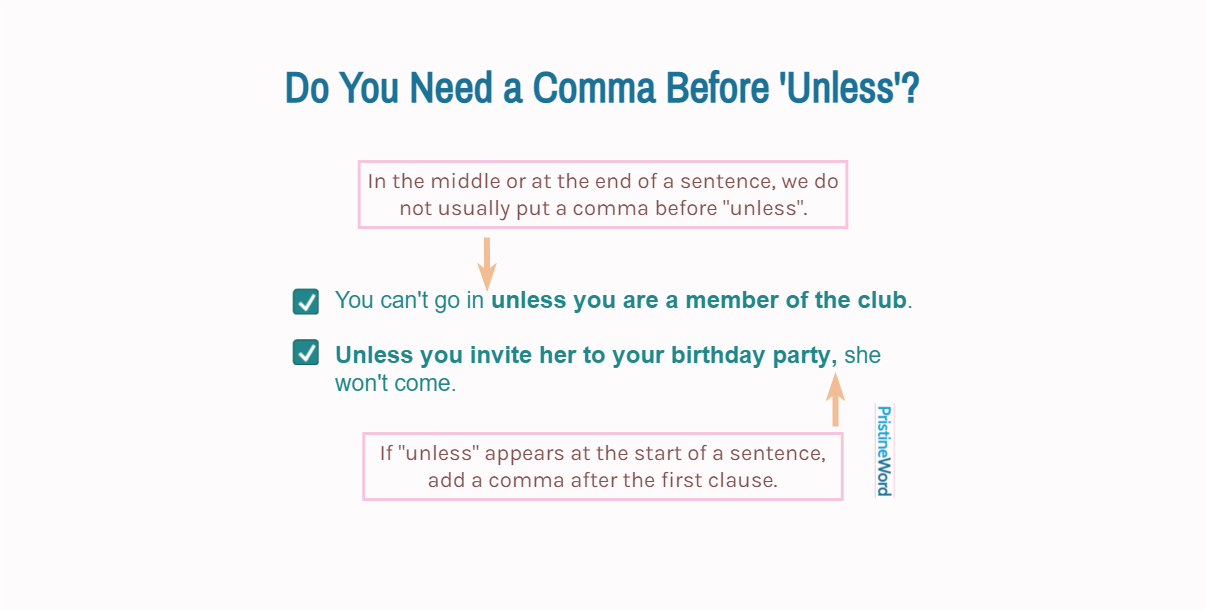If "unless" appears at the start of a sentence, add a comma after the first clause.
In the middle or at the end of a sentence, we do not usually put a comma before "unless".
You can't go in unless you are a member of the club.
If "unless" appears at the start of a sentence, add a comma after the first clause.
Unless you invite her to your birthday party, she won't come.
Unless you invite her to your birthday party she won't come.
Contents
1. Using 'Unless' in mid-sentence
General rule
In the middle of a sentence, we do not typically place a comma before a clause introduced by "unless" or another subordinating conjunction.
We'll go for a walk unless it rains.
There are particular situations, however, where you may need a comma before "unless". For example, use a comma to introduce a warning signal or clarify complicated sentences.
Introducing warning signals
Look at this sentence:
You have to do the job properly, unless you want to get fired.
In the example above, "unless you want to get fired" is just a warning signal. It emphasizes the main part of the sentence without changing its basic meaning. The comma conveys that getting fired is not a likely scenario (at least for now).
We do not need a comma, however, if "unless" is essential to understand the meaning of the sentence or introduces a plausible scenario.
I'll see you tomorrow unless I have to work late.
Clarifying long or complicated sentences
Examine this example:
James never does his homework, makes his bed, or puts away clutter in appropriate locations, unless his mother tells him to do so.
The comma before "unless his mother tells him to do so" helps clarify that the "unless" clause refers to the rest of the sentence as a whole, and not just the last item.
2. 'Unless' at the Beginning of a Sentence
The conjunction "unless" always introduces a dependent clause ("Unless Olivia studies a bit harder" in the example below).
Unless Olivia studies a bit harder, she won't pass the exam.
When starting a sentence with a dependent clause, add a comma after it.
Unless we leave now, we'll miss the flight.
Unless we leave now we'll miss the flight.
Another example:
Unless you take a break and take care of yourself, you will end up exhausted after such a huge effort.
Follow the same comma guidelines with other subordinating conjunctions.
3. More Examples
- You won't solve your daily life problems unless you practice yoga or deep breathing exercises.
- Unless it's an emergency, you should not use the cell phone during the meeting.
- We'll experience air pollution, scarcity of water, and loss of biodiversity, unless we take care of our planet.
- Unless it is absolutely necessary to run the software in your system, disable it.
- You won't learn how to do it unless you listen carefully.
- I'll never speak to Rebecca again unless she apologizes for hurting my feelings.
- Unless you want to die today, I suggest you do everything I say.
- Don't use a hammer to release the wheel unless it is absolutely necessary.
- Unless you speak very slowly, Alberto won't be able to understand you.
4. Conclusion
Follow these simple guidelines to determine whether to place a comma before "unless":
- In general, do not use a comma in front of "unless" in mid-sentence.
- When introducing a sentence with the conjunction "unless", insert a comma after the first clause.

